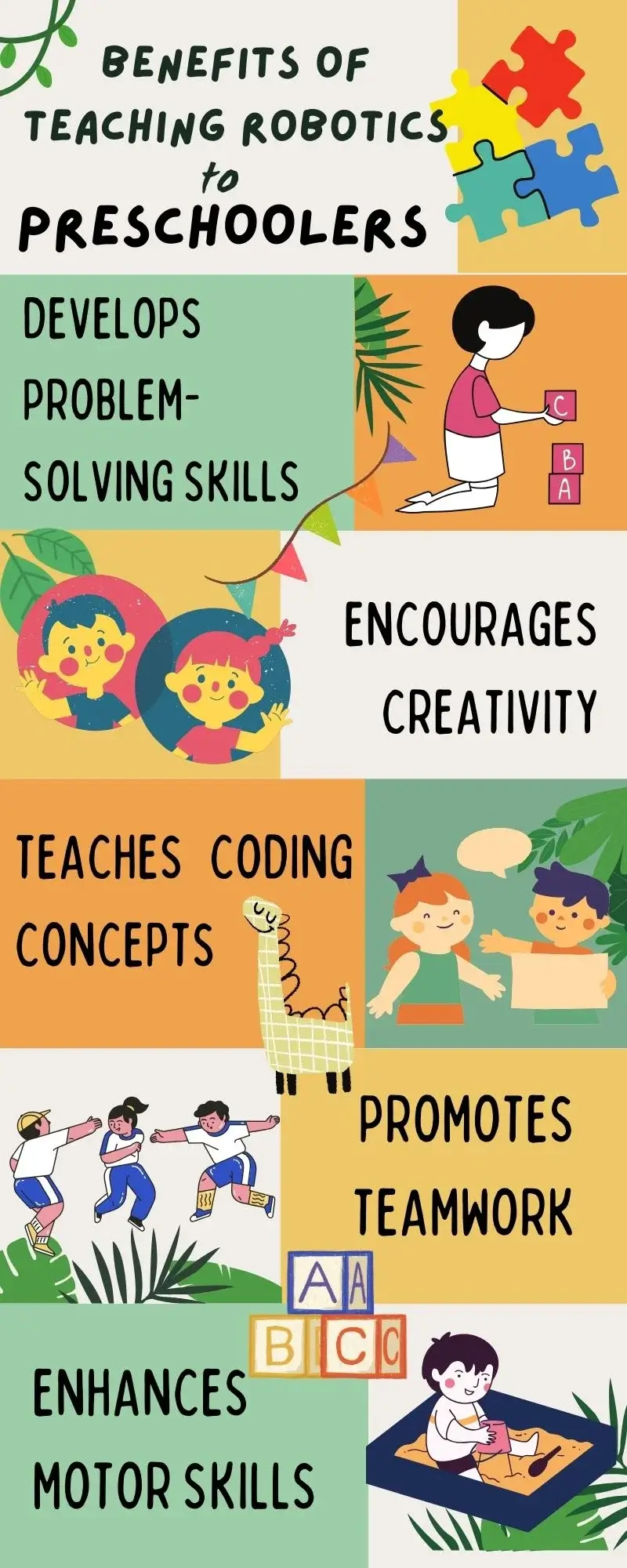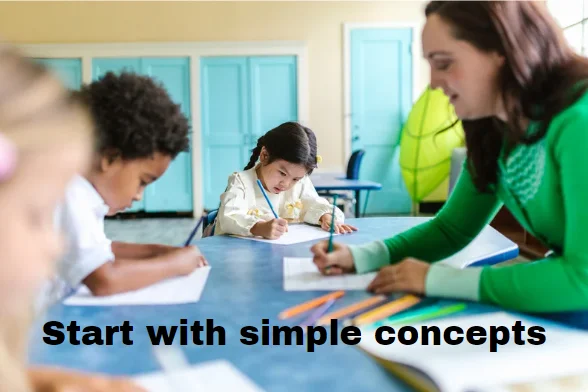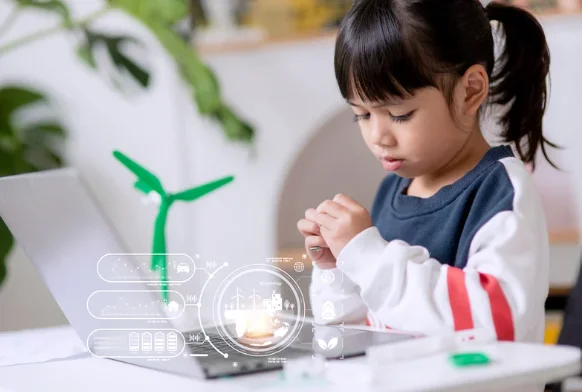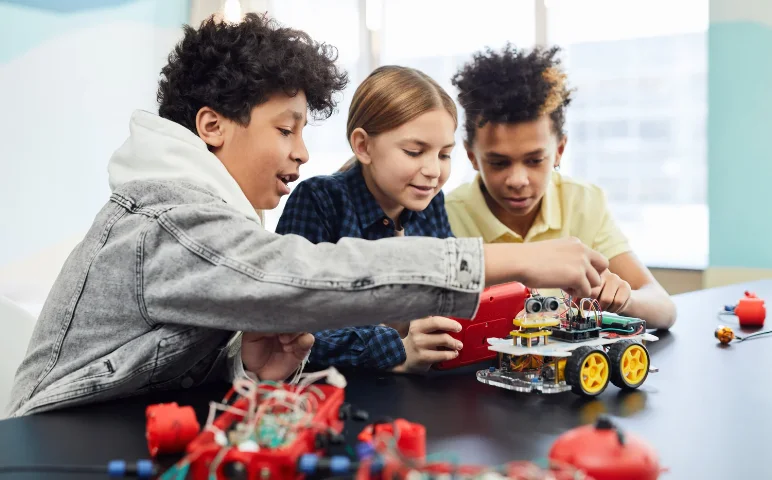
Update: This article was last updated on 13th January 2025 to reflect the accuracy and up-to-date information on the page.
In today’s rapidly changing world, children need to develop a wide range of skills, including problem-solving, critical thinking, leadership, and communication skills, in order to grow and thrive. Introducing them to robotics can be one effective way to foster such future-ready skills in children. The interactive and engaging nature of robotics is sure to ignite the curiosity of children about science, technology, engineering, and math (STEM).
Robotics for preschoolers, in addition, develops their motor skills while teaching the child important life skills. In this blog post, Moonpreneur explores the benefits of bringing robotics to preschoolers and shares practical tips on how to do it successfully.
Benefits of teaching robotics to preschoolers:

1. Develops problem-solving skills
Activities like tracing robot shapes, playing the robot puzzle, and working on the robotic kits available in stores, as seen with the Traffic Light Kit, will not only help preschoolers learn a little about robotics preschool but also help them achieve critical thinking skills. It will encourage kids to think, eliminate obstacles, and finish tasks effectively. Provided with constant practice, they will know how to spot challenges, find a problem-solving technique, identify the source, and craft effective remedies.
2. Encourages creativity
The preschool robotics is enhancing the creativity in young children while performing practical activities. Designing and building a robot offers a child an avenue to try his ideas and to find novel ways of solving certain problems. For instance, one can experiment with various shapes, colors, and materials to design a robot that is both different and functional. The process thus encourages preschoolers to think out of the box and enhances their identity and self-expression. Creativity is fostered by preschool robotics as children see their robot ideas materialize.
Creativity can be encouraged in preschoolers, thus boosting their confidence and self-esteem as they see their robot designs materialize.
3. Teaches coding concepts
Robotics activities for preschoolers can help preschoolers dive into the world of coding, making learning fun and enjoyable. These activities introduce them to foundational concepts such as sequencing, loops, and basic programming using simple languages such as Scratch.
Preschoolers learn coding basics through robotics activities, which are really fun and interesting. For example, simple programming languages like Scratch could be used in teaching sequencing loops and other concepts that are basic for coding.
Later on, the children will make a solid computer science foundation from the basic understanding of coding fundamentals they have acquired, and they would also get to be familiar with the computer and really develop an interest in computer science through hands-on preschool robotics.
4. Promotes teamwork
Robotics and coding for preschool are excellent interactive ways that the young learner develops critical thinking, creativity, and problem-solving skills as they get early interest in technology and other STEM concepts.
When a group of preschoolers work on a robotics project to design and construct their robots, they are forced to cooperate and communicate with one another for the robot to work as planned.
By working together on a project, preschoolers can develop essential collaboration skills such as communication, cooperation, and problem-solving.
These skills are essential for success in all areas of life, from employment to school and interpersonal interactions.
5. Enhances motor skills
Robot activities for preschoolers provide an excellent opportunity for fine motor abilities, which are essential to moving small objects, assembling parts, and building robots. Preschoolers can gain benefits from these exercises by developing their dexterity, hand-eye coordination, and spatial awareness.
In addition, some robotics activities require you to move around in person, like moving a robot through an obstacle course or using it to pick up goods.
These exercises can be helpful for children as they develop strength, coordination, and other gross motor skills.
List of Books for Preschoolers
| Book Title | Author's Name |
|---|---|
| The Very Hungry Caterpillar | Eric Carle |
| Goodnight Moon | Margaret Wise Brown |
| Brown Bear, Brown Bear, What Do You See? | Bill Martin Jr. and Eric Carle |
| Where the Wild Things Are | Maurice Sendak |
| Don't Let the Pigeon Drive the Bus! | Mo Willems |
| If You Give a Mouse a Cookie | Laura Numeroff |
| The Snowy Day | Ezra Jack Keats |
| We're All Wonders | R.J. Palacio |
| Pete the Cat: I Love My White Shoes | Eric Litwin and James Dean |
| Blueberries for Sal | Robert McCloskey |
How to teach robotics to preschoolers?

1. Begin with easy concepts
One must begin with easy ideas which are very easy to understand by preschoolers while teaching kids about robotics. They possess limited mental power and their span of concentration is very small.
Utilize easy exercises and vocabulary appropriate for preschoolers.
2. Materials appropriate for their age
When teaching robotics to preschoolers, it’s essential to use tools that are age-appropriate, safe, and user-friendly. If the materials are vibrant and entertaining, kids are more likely to be interested and enthusiastic about them. To ensure a safe and enjoyable experience with robotics, it’s crucial to choose materials that are suitable for their age and to supervise them. At the same time, they work with the materials to ensure responsible and safe usage.


3. Use play
Robotics preschool activities bring together playing and learning. Robotics preschool encourages preschoolers to explore, discover, and play with the materials in a creative and playful way. This activity helps the child to design and test the robot as they imagine. In this, children will develop basic robotics skills, while creativity and problem-solving will be stimulated.
4. Provide guidance and support
Teaching robotics to preschoolers is about providing guidance and support to help them grasp concepts and be able to complete tasks. The support and encouragement needed at this age make them feel motivated and confident when learning. Through the inclusion of robotics for preschoolers, age-appropriate materials, simple principles, play, teamwork, and guidance, you can develop a growth mindset and encourage a lifelong passion for learning. It is going to be a mixture of practical activities and wise facilitation that would equip them with very vital skills to apply both in their study and profession.


This graph provides insights into the educational robot market size from 2022 to 2032, highlighting the growing influence of educational robots in the global market.
Robotics activities for preschoolers can be very exciting and engaging while making the process of teaching STEM concepts more accessible and friendly to the younger generation to make learning both enjoyable and rewarding.
Moonpreneur is the innovation of revolutionizing traditional learning to better equip the next generation. Our Innovator Program enables students to master the most relevant skills in AI/ML, Robotics, Coding, Game Development, and App Development with entrepreneurship at its core. The initiative helps in developing the future workforce through school curriculums by including innovative technologies and practical skills.
Join our free 60-minute workshop today!

























Pairing robotics toys with storytelling is useful for my kids. For instance, we could create a story where the robot helps characters go on an adventure. It really makes learning so much more exciting for them!
I am curious to know which robotics kits are specifically designed for preschoolers and engage them the most while keeping it educational. Any recommendations for beginners?